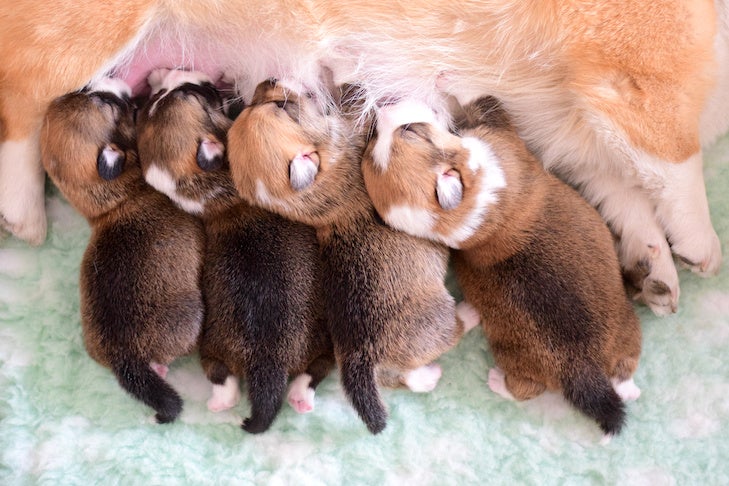Once the anticipation and waiting are over, and your pregnant dog has successfully delivered her new litter of puppies into the world, it is time to roll up your sleeves and dig into the business of caring for your newborn puppies.
This care starts even before the puppies are born, but the moment they are, it (of course) continues. After you have taken care of helping the mother clean up the puppies and have ensured that all puppies are breathing, you must help your bitch turn to the important task of nursing.
Newborn Puppy Nutrition
Newborn puppies depend on their mother for nutrition during the first weeks of their lives. For the first few days, the bitch produces a milk-like substance called colostrum. Colostrum contains the essential maternal antibodies that the puppies will depend on while their immune systems mature. These antibodies help them fight off infections, and so it is crucial that all of the puppies receive enough colostrum during this time.

The AKC advises that as the puppies grow, owners keep track of their weight, especially during the first few weeks. Talk to your veterinarian about the appropriate weight gains to expect for your dog’s breed and monitor all of the puppies for signs of malnourishment.
Most mothers do not develop problems during nursing. However, all breeders should be aware of the signs of canine mastitis. Mastitis is a bacterial infection of one or more of the lactating glands in the breast, which is painful for the bitch and limits the availability of milk. A bitch with mastitis will develop hot, dark, red, painful teats, and she may snap at puppies who attempt to nurse. Mastitis can be caused by weaning too early, a scratch (such as from the puppies’ nails), a blocked milk duct, or an infection. If you suspect your nursing female has mastitis, call your veterinarian. Puppies should not be allowed to nurse from bitches suffering from mastitis.
Feeding the Nursing Dog
The nutrition of the puppies depends, of course, on the health of their mother. Lactating dogs require more energy than pregnant or non-lactating dogs, especially as the puppies get older. You may need to switch your dog to a complete and balanced diet with a higher fat content while she is nursing. Your veterinarian is an excellent source of nutritional information during this time and can help you find the right food for your nursing female.
Your bitch may be off her feed the first day after whelping, but she should be eating within 24 hours of delivering her last puppy. If she’s not, this could be a problem and you should consult your veterinarian, as this may indicate an after-birth complication.
More information about feeding nursing bitches

Newborn Puppy Temperature Control
Newborn puppies cannot control their body temperature. This means that owners need to make sure that puppies are kept in a warm, draft-free environment, as exposure to cold stresses the puppies and exposes them to disease. The Merck Veterinary Manual recommends using a heat lamp to keep the new litter warm, as long as you provide a slightly cooler location within the whelping pen to prevent the puppies from overheating, and position the lamp far enough overhead that it does not burn the puppies or the mother. Or, consider placing the heat lamp at the corner of the whelping box so that the puppies can crawl to another corner if overly warm. They recommend heat lamps over heating pads, as heating pads are more likely to burn puppies.
Newborn Puppy Health Problems
After all of the puppies have eaten, the breeder should perform an inspection to make sure they are each healthy and normal. If this is your first time breeding, talk to your veterinarian about what to expect and look for. Healthy newborns should have a healthy suck reflex, a normal and functioning urethra and anus, no cleft palate, pink and moist gums and mucous membranes, and a healthy coat.
Dr. Klein, our Chief Veterinary Officer, recommends purchasing a baby scale to monitor weight gain in each puppy. You should weigh each puppy at birth, and again at 12 hours, 24 hours, 48 hours, 3 days, 5 days, and 7 days. All puppies should show a gradual weight gain.
The biggest health concern with newborns is temperature regulation, as mentioned above. Young puppies are particularly susceptible to disease and infection, and a low body temperate puts stress on their already susceptible immunity. It also impacts their ability to nurse and digest food, which puts further stress on their young bodies. If a puppy becomes chilled, it is important to warm it back up gradually and to abstain from feeding until the puppy is warm and stable to prevent aspiration.
Puppies rely on their mother’s antibodies to get them through their first few weeks of life. Puppies start to lose this immunity between six and eight weeks of age, at around the time they receive their first vaccines. However, maternal antibodies are not a guaranteed protection against infectious diseases. Keep your newborn puppies away from unvaccinated dogs and talk to your vet about parasite control in puppies.
Caring for Orphaned Newborn Puppies
The term “orphaned” does not always mean that the mother of the litter dies. It is also used to refer to puppies whose dam is either unable or unwilling to nurse them. If this happens, you will need to step up to the plate as nursemaid.
The best replacement milk for puppies is a commercial puppy milk formula. Cow’s milk does not have the same nutritional content as dog’s milk and is not a suitable substitute, as it does not have enough calories, calcium, or phosphorous for growing pups. Puppy formula bags come with manufacturer’s instructions regarding mixing guidelines and how much to feed. If you have questions about these instructions, contact your veterinarian.
Feeding orphan puppies can be a little tricky. Some puppies take a little while to get the sucking part of feeding down. If they don’t nurse right away, you may have to take them in to see the veterinarian, so that he or she can show you how to tube feed to get the puppies started.

It is tempting to make up large batches of formula to make feedings easier. However, formula is the perfect breeding ground for bacteria, so only make up enough for each feeding and thoroughly clean and sterilize the bottle and mixing utensils in between uses. The instructions on the bag will help you determine how much formula to feed your puppies, but you may find that certain puppies require more or slightly less food than others. The best way to determine if your puppies are getting the right amount of food is steady weight gain and normal, well-formed stool. If a puppy develops diarrhea, try reducing the amount of food by half, or consider diluting it by adding a bit of extra water, and slowly work your way back up to the recommended level. If the diarrhea continues, call your veterinarian in case it is a sign of a more serious problem.
Feeding itself is usually straightforward. Warm up the formula to body temperature (around 100 degrees) and angle the bottle to prevent air bubbles. You may need to enlarge the hole in the nipple, which is best done with a hot needle while the bottle is inverted. Always feed a puppy facedown, never on its back or upright, as this could cause it to choke. Puppies should nurse enthusiastically, but not too rapidly, as this can cause indigestion. The puppies should be burped during and after each feeding.
There are two parts to feeding orphan puppies: feeding and eliminating. Bitches stimulate their puppies to urinate and defecate by licking them. Owners can simulate this by using a clean cotton ball dipped in warm water to rub the anal and genital area. Mothers also groom their puppies throughout the day, and the AKC believes that this massage is important for puppy health and development. Try stroking the puppy’s sides and back several times a day with a soft cloth while you are waiting for the formula to warm up to 100 degrees.
Registering Your Puppies
If you plan on registering your newborn puppies with the AKC, now is the time. Registration offers benefits to you, prospective owners, and the breed. When you register your litter, you:
- Establish a record of your breeding program
- Give prospective owners access to important information like bloodlines, and open the doors to AKC events, services, and information
- Help the AKC track the development of the breed
If this appeals to you, check out the online litter registration system to get started.
Raising a litter of puppies is incredibly rewarding. Doing your research ahead of time can take some of the stress off of your shoulders, allowing you to devote all of your attention to the care of your new litter.


